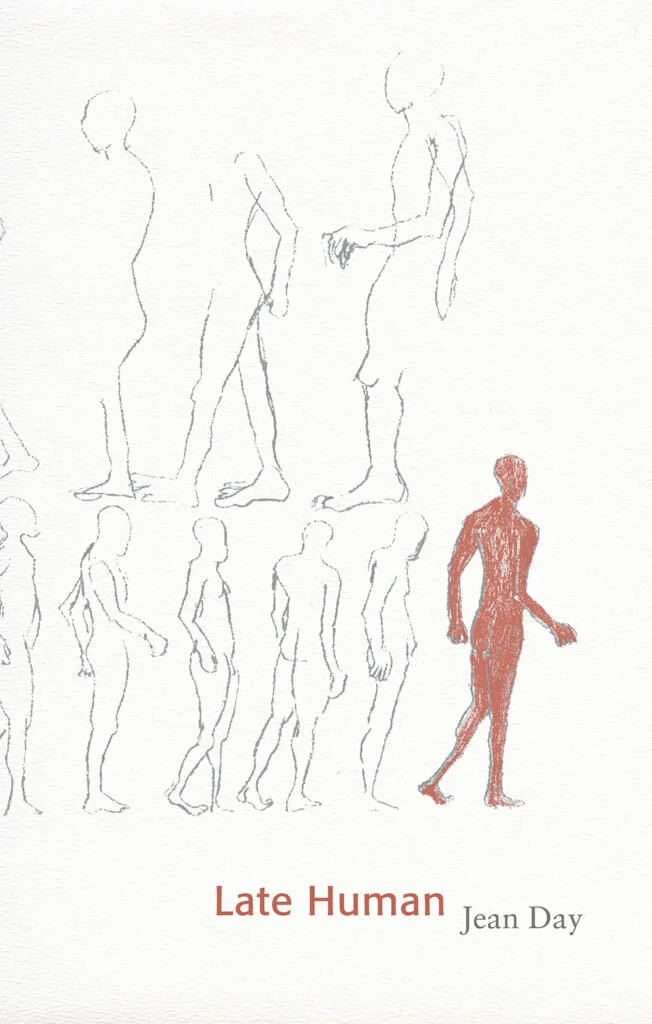Reviewed by Sarah D’Stair
Jean Day's poetry in Late Human makes one feel like they are standing still in a hard, pelting rain. The poetic voice is rapid, breathless, overwhelmed and overwhelming, bombarding us with image and insight to the point of fragmentation and fatigue. It is a purposeful inundation, crafted with meticulous care to wear us down in the same way modern living burdens our individual and collective psyches.
Day's collection is quite cerebral. The poet theorizes the "late human" as academics theorize "late capitalism" or as oncologists examine "late effects" of chemical radiation. Day asks us to consider what happens to human forms of thinking and knowing in an era defined by a total integration of the human psyche with the techno-cultural forms it has created. Are we, writ large, cyborg creatures, all of us with little machines now extensions of our hands? Are we capable of any distinct thought not in some way impacted by the endless stream of manufactured stimuli designed to entertain us? Are we capable of anything close to concentration?
The inventiveness of Day's poetry isn't necessarily in its newness of language, but rather in its ability to flood us with the familiar, showing us with poetic aggression how it all becomes noise in our heads, how it occludes depth of thought and creativity. Each poem represents what it feels like to be walking flickers of content housed within living bodies. Much of the verse feels like being inside a mind saturated with popular culture—clichés, movie lines, and music lyrics dot the mental landscape.
The poem "Dead Pan" is composed as a collage of well-known phrases lacking distinct referent aside from our own cultural familiarity. In one example, Lady Gaga and The Sound of Music populate the same space: "Don't make me / tell your poker face / so long farewell auf Wiedersehen goodbye." Other lines reflect the internalized mind chatter that informs our perceptions of daily living:
Stay calm and carry on
as cooler weather makes its entry into Eden
Wrap up your junk and cover your face
we're only called "Sir" for a season
in interference
Item: Is it strange we don't yet
call a spade a spade
or refugee an angel?
We recognize, perhaps only in fleeting ways, so many of these phrases from motivational posters, weather reports, religious services, and idioms that have lost their origins. Yet buried in the poem, like pleas from deep within the psyche, are two lines, imprisoned within heavy brackets, that seem like the original self, crying out amid the cacophony: [Who am I?] / [[And for what?]]
Day invites us to read as anthropologists of our own cultural moment, to question stimuli we are taught to value. Yet even our most insightful analyses cannot be trusted. The poem "Lost Illusions" explores this conundrum: we are saturated with illusion, and what is "lost" is not necessarily the "real" but rather the understanding that what we see before us are illusions. We mistake what is false for what is real, what is entertainment for what is truth; and eventually (perhaps we are already there), we reach a state of consciousness that finds the difference to be irrelevant. With prescient accuracy, Day describes this state of being as follows: "I can't embody anything imagined / because nothing new is really nothing known." In such a media-obsessed culture, embodiment becomes replaced with a version of truth that penetrates only as far as our visual cortex.
The poems read like broken concentration, presenting numerous realities and narratives simultaneously. It all feels rather kaleidoscopic, each turn of the wheel revealing a new pattern that must be processed in a split second before the next pattern takes shape. Blink, and you'll miss it, so best to keep your eyes open. Consider this excerpt from "Low Life:"
As human industry regardless
regards us
panhandling from a textbook
to get the feel of
our fingering weight
relative to what we undertake
or have already taken
having summoned our friends
from the public house
We have survived the double
talk of spring
when all we have is rain
What's left then of our
agency as agents?
Dinged sincerity?
The verse skates us across a slippery surface and propels us toward the struggle to find our footing. The pace is relentless, rendering us powerless against its accumulated inertia. We feel out of control, knowing how little of "our agency as agents" we can possibly maintain. Nonetheless, we persist. I love these poems for just that quality—reading them is like finding oneself in the middle of middle age, looking back to see how it's all gone so quickly, realizing how little was ever in your control anyway.
Day understands implicitly that truth cannot be expressed in language, that fragments of consciousness come together in fleeting moments, guided by some ethereal wiser self, to put the pieces together to form a perspective. The verse mirrors that internal process—many disparate voices synthesized into a single, unified, yet momentary vision that can be felt but not necessarily analyzed.
The poem "Late Human" explores what seems to be the final stages of the human species before a dramatic evolution toward something new and unknown. So much global discord stems from anxiety about these vast changes; we are ever more connected, more the playthings of corporate greed, increasingly destined for a cyborg future. The poem, and indeed the collection as a whole, is distinctly attuned to these anxieties, giving word and rhythm to their vibrations, coherence to their abstractions. Perhaps, as the eponymous poem suggests, the best we can hope for in the face of it all is some minuscule utility. Amid the overwhelming tumult, we can, at the very least, face a dinner companion with energetic joy and declare, "If you do the kale, I'll to the rice / No choice but to be useful!" Indeed, it's the least we can do.

